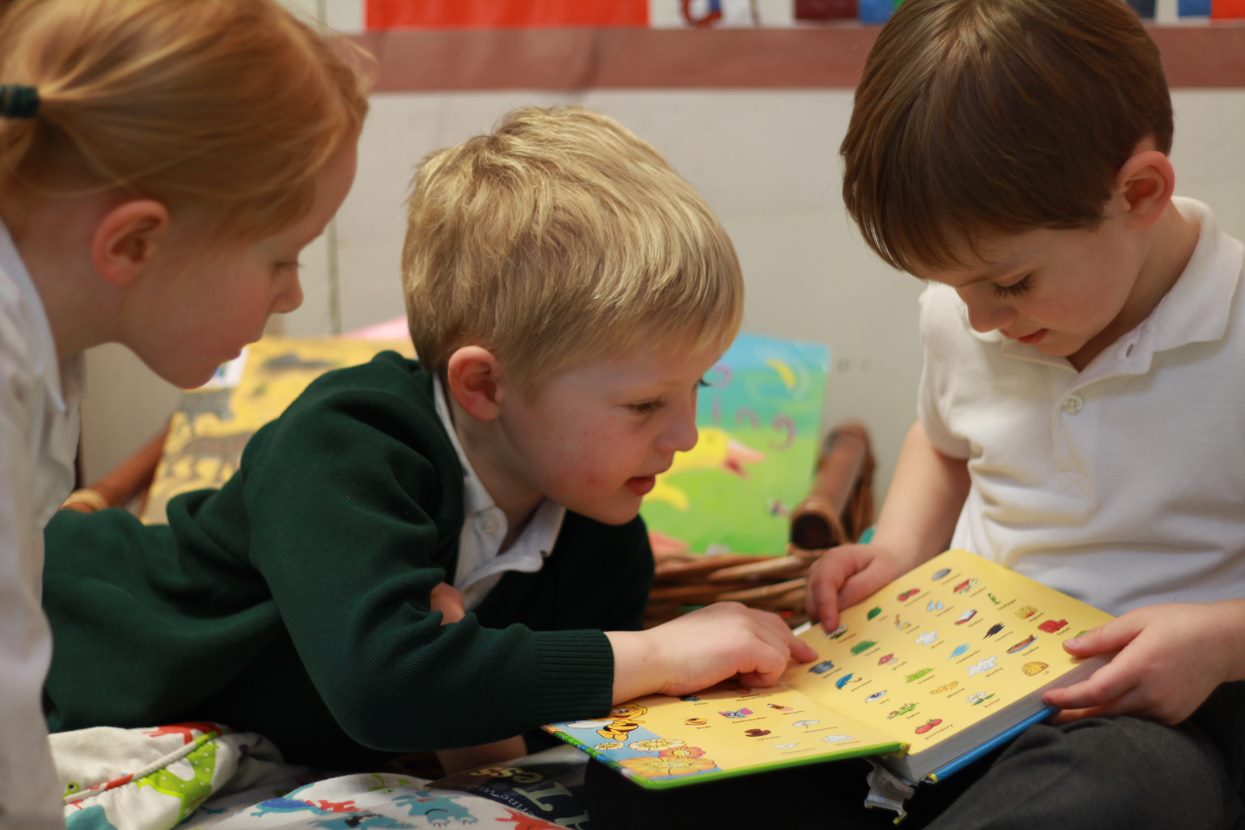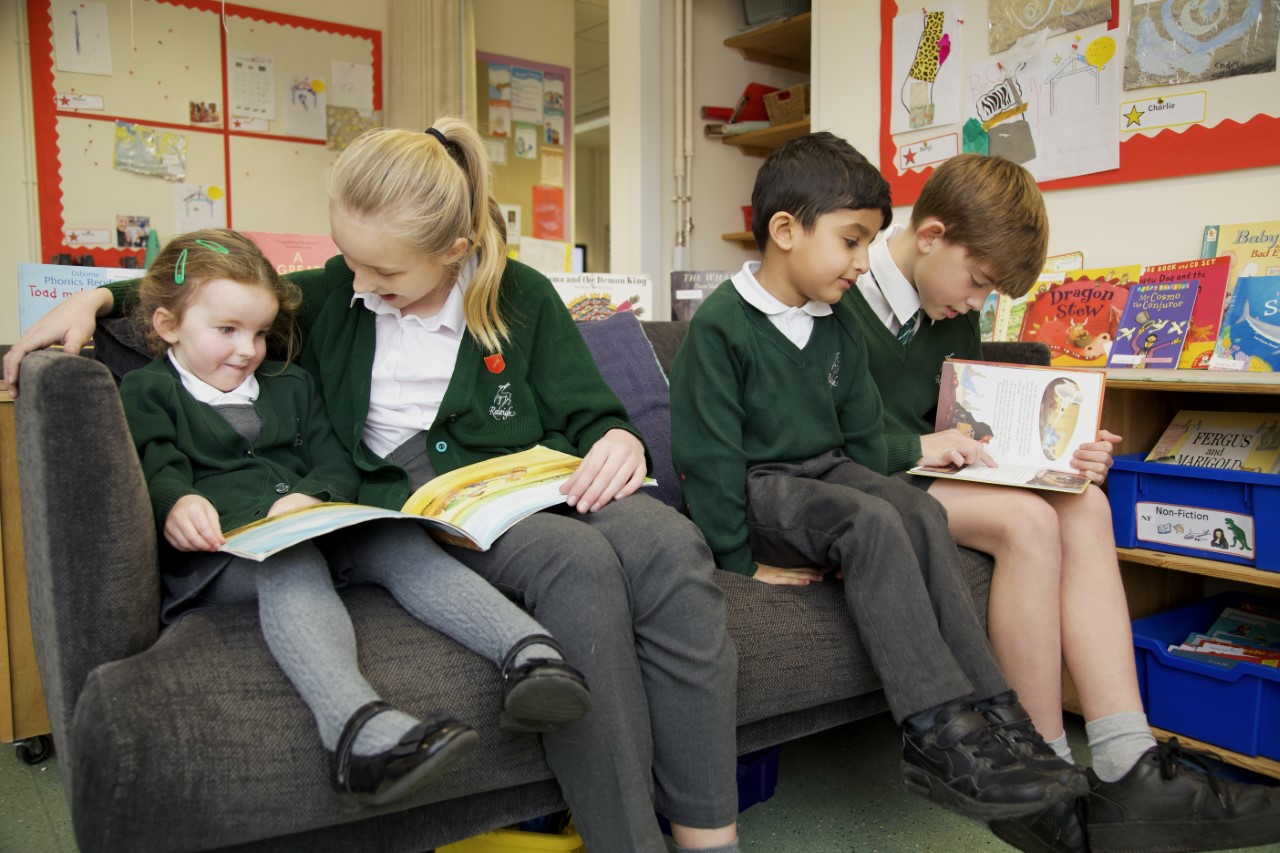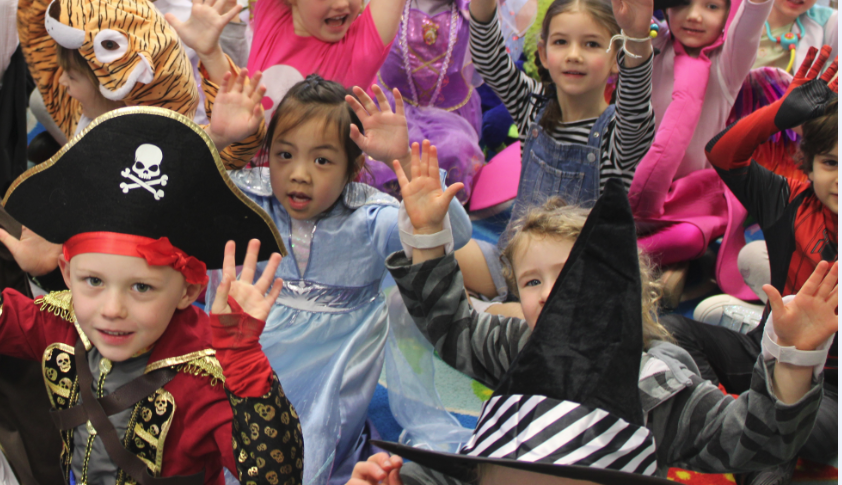English and Languages
Our curriculum is balanced and broadly based. It consists of all the activities designed or encouraged in the school to develop the intellectual, personal, social and physical activities in the children.
At The Raleigh School, our English curriculum is designed with the intention of equipping all children with a strong command of the spoken and written word. We aspire to develop their love of literature through widespread reading for enjoyment and knowledge and ensure they develop the cultural capital needed to excel in the future. We provide an environment that is rich in language in order to immerse the children in the sounds and words that will form part of their written and spoken communication.
Our comprehensive English curriculum follows the aims and objectives of the 2014 National Curriculum, augmented by our wonderful library and a diverse range of wider activities and events.
All children from Year R to Year 6 also benefit from a weekly French lesson as part of our commitment to fostering curiosity beyond our own borders and developing an understanding of the diverse, multicultural world within which we all live. We are incredibly proud to hold the British Council International Schools Award which further emphasises our commitment to global citizenship.
Please find below further information about the teaching of English and Modern Foreign Languages (MFL) at The Raleigh School, including a breakdown of how each aspect of English is taught.


English Curriculum Aims and Organisation
Our aims in teaching English are rooted in the 2014 National Curriculum and ensure that all children will:
- Develop the necessary skills to use the English language confidently, appropriately and accurately to the best of their ability
- Be able to speak clearly, fluently and cogently
- Be able to listen to the spoken word attentively with understanding
- Be able to read a range of materials fluently and with understanding for enjoyment and for information
- Be able to write effectively for a range of audiences and purposes using spelling, punctuation and syntax accurately and confidently
As the children progress through their years at The Raleigh School, they develop a strong command of language; as the curriculum is designed to continually develop and progress their learning across all aspects of English. The children will frequently focus on a text which they will study through a lens of comprehension, grammar, spoken language and writing. This allows the children to develop the necessary stamina for reading, writing and communicating that they will require to be ready for the next stages of their education.
The English curriculum is organised as follows at The Raleigh School:
- Daily English lesson timetabled with a focus on one genre / text type across the week. Children begin the week by exploring a text, explore a discrete aspect of grammar, further explore the text or genre through a variety of language rich spoken language activities, draft and rewrite a piece of extended writing based on the week's genre.
- We use a combination of commercially produced and school produced materials to deliver our curriculum which have been rigorously evaluated across many years as part of our 'mechanism for change' procedure.
- Equal importance given to all aspects of the English curriculum
- Oxford Owl reading scheme in place which draws on the highest quality texts available - mapped to pupils' emerging needs and regularly monitored
- Daily phonics lessons in EYFS & KS1, grouped by ability until all children meet or exceed the required standard - we regularly exceed 95% phonics pass rate. This is achieved using the Phonics Steps programme
- Cross-curricular links are a fundamental part of English teaching and learning and are made both implicitly and explicitly during lessons across the curriculum
- Provision is made for the full range of pupils needs and abilities by extra support from the SEN team both on individual basis and in Extended Learning Groups and by the use of teaching assistants under instruction from the class teacher
- Rigorous standards of English upheld and in written work across the entire curriculum, not just in dedicated English lessons
Spoken Language
The ability to articulate thoughts and ideas and to listen to others are fundamental language skills. There are two dimensions to talk: Social and Cognitive - making connections through thought from concept to concept. Both need to be catered for in the classroom, especially the cognitive as this will influence a child's ability to learn right across the curriculum.
Spoken language at The Raleigh School is developed through:
- Providing a range of opportunities for children to talk and listen in formal and informal settings
- The use of drama and role play to explore imagined situations
- Links between language and music exploring rhythm
- A regular story time when the teacher or other adult reads aloud to the class
- Class discussion and debate on topical or contentious issues, both local and world-wide
- Showing times or news sharing when pupils are encouraged to speak to their assembled class
- Use of the Spoken Language objectives from the National Curriculum
Reading
Reading is a crucially important skill that allows children to better understand the world around them, to engage with ideas and concepts beyond their own reality, and to spark and fuel their imagination and creativity amongst a plethora of other benefits. At The Raleigh School, we consider reading to be not only fundamental for accessing the full curriculum, but also to be integral for personal fulfilment.
Studies have shown that children who choose to read, enjoy reading and read regularly reap the following benefits:
- Socially (gaining an understanding of people, the world, life experiences and ability to empathise and interpret situations)
- Academically (through language acquisition, reading proficiency, improved comprehension, greater cognitive development and ability to absorb and understand information in all subjects)
- Areas of health (developing self-confidence, self-esteem and emotional vocabulary)
Reading at The Raleigh School is developed through:
- Providing a wide range of reading material and opportunities for children to select from this for information and for entertainment, freely accessible via our library and book corners
- Use of a structured reading scheme, refined and curated over many years to build confidence, fluency, and understanding (including the use of closely matched phonics books for those learning phonics)
- Regular 1:1 and small group reading in school with teachers, teaching assistants and parent volunteers
- Opportunities for independent quiet reading in class and in our library
- Home-school reading expectations with guidance available for parents to support children to develop both fluency and comprehension
- Dedicated comprehension lessons each week as part of timetabled English lessons
- A wide range of written resources used as part of other curriculum areas such as STEM, Humanities
- Mystery Reader initiative for our younger pupils - including parents, members of the local community and returning pupils
Phonics
Phonics is the way that letters sound individually and in groups (a, b, c sh, igh etc) and this knowledge forms the backbone of both early reading and writing. As a Trust we have devised our own phonics scheme, Phonics Steps, which is designed to be a pacey, kinaesthetic and fun way for children to learn these phonics sounds (phonemes) as well as how to push them together when they read (blending). Our phonics scheme is broken up into 5 different phases. The children are assessed, grouped by their existing phonics knowledge and then taught the phonics phase that is their next step. These phonics lessons happen daily and are run by the staff team in that year group. The pace of these sessions is fast, so sometimes children need to go through a particular phase a second time, which our flexible grouping, allows for. Revision is built into the Phonics Steps scheme, with recapping of recently acquired knowledge in every lesson.
Phonics Steps Parent Information Session
Phonics in Action
Word Reading
Some words are not decodable using phonics, so the children need to be able to recognise these words as a whole. The learning of these ‘tricky words’ is an important part of phonics lessons, with each one focussing on some of these key words.
Comprehension
As well as decoding a book (working out what the words say individually), it is important that children understand what they have read. This can be difficult when starting the reading journey, so our reading programme is designed so that children to read texts more than once. This helps their fluency, which in turn, enables them to understand more of what they have read. Initially, we ask them questions which require them to recall what they have read. We then move on to questions that require them to make predictions and begin to read between the lines to find the answer.
Decodable Books
While children are learning phonics, they will read books which exactly match their phonics and tricky word knowledge. The aim of this approach is that children understand that by applying their growing knowledge, they will be able to read independently. Giving children the skills that they need, before they tackle each text, means that they have a high success rate and so become more confident in their reading skills from the very start. The books that children are given to read, are all from Oxford University Press. To ensure that the children have all the phonic knowledge required to read their given book, all texts are organised by phase and by week. Alongside these scheme books, children select a ‘sharing text’. These high-quality fiction, non- fiction and poetry books are designed, not for the child to read, but to be shared by families at home. We have a duty to ensure that all children have a varied and exciting reading diet, hence each child will bring home one of these texts each day.
Assessment
Once children have completed a phonics phase, they are assessed on their knowledge of the phonics and recognition of tricky words from that phase. Children who have shown a secure grasp of the phase they are working on are then moved on to the next phase.
Reading at Home
Reading should be a regular part of every child’s week. In Reception and KS1 they should read 5 times a week, but probably for a short time. In KS2, children will still read 5 times but with the expectation that they read for longer. In the early stages, the books that they bring home will have been read previously at school. The aim in re-reading these texts is to increase their fluency and flow, so that they are better placed to make sense of what they have read. Finding the right time and place will help; if the evenings are fraught, parents might try reading in the morning.
Parents or children should record the date and title of the book and ideally add a brief comment in the child’s reading diary. Noting any questions here works well, as staff are very happy to offer support and advise.
If a child is stuck on a word, they should be encouraged to apply their existing knowledge, be that recognition of the whole word or application of their phonics knowledge. They should always say the pure sound without a schwa on the end, as this makes blending the sounds together much easier. A schwa is the ‘uh’ sound that we sometimes say on the end of letters sounds (suh rather than ssss for example).
In the early stages of learning to read, children should be encouraged to use their fingers to count the phonemes (sounds) in the words. This slows them down and helps them to blend the phonemes successfully. It can be tempting to jump in and tell them the word, but this can be counterproductive. They will have strategies to help them to decode most words and giving them the time to use them, will help them to see reading as something that they can be successful at.
Again, in the early stages of learning to read, children need to point at the words themselves. This simple technique really helps children to focus in on the text, which in turn, helps them to read with independence.
When reading with a child, always check for understanding, by asking what has happened on that page or in the book as a whole. Asking what they think of the book is a simple way to do this, as is asking them to make predictions about what might happen next.
Whatever a child’s age, nothing encourages like praise. The main thing is to make sure that reading together is an enjoyable experience for everyone.
Reading Diet
In addition to the books that children read themselves, children will be exposed to many other texts at school. These texts will be used during guided reading lessons as well as class story time sessions. These texts are carefully selected by staff, with the English subject leaders having an overview of the texts used across the school. Through this we offer children a varied diet of high-quality texts, which include fiction non-fiction and poetry. The books that we select are updated regularly to ensure that new books form part of our offer.
How can I further support my child at home?
Please find below some useful guides / links to help support your child's reading at home.
Language in the Early Years
As the children arrive in Reception there is a strong focus on Communication, Language and Literacy (CLL).
Language in the Early Years
From the moment children arrive in Reception, there is a strong focus on Communication, Language and Literacy (CLL). The children take small steps, beginning by:
- listening to and engaging with stories, songs and rhymes
- responding to what they have heard with their own ideas
- using language to imagine whilst they play
Oral language development plays a central role in early childhood. It facilitates social and emotional development and provides the building blocks for the development of later literacy skills. Oracy also enables smooth transition to the primary classroom and builds children’s capacity to benefit from all aspects of school life.
At The Raleigh, we understand this, and our aim is that all children are offered a language rich curriculum and environment which exposes them to rich and varied language. We do this by ensuring that talk is part of every activity. In addition, activities with a teacher or teaching assistant, are planned for those children who are finding language acquisition more difficult.
The children also learn how to pronounce and write sounds through a systematic program of phonics (Phonics Steps), where they continually progress and learn new sounds for which they have a book matched to the individual sounds they have learned in school – as well as a book to instil a love of reading.
At the start of each year, information is issued to parents about our phonics programme and ways in which the children can be supported to develop their skills at home.
Modern Foreign Languages (MFL) at The Raleigh School
The intention of our French (MFL) curriculum is to open opportunities, foster curiosity and deepen understanding of the world and different cultures. We aim to enable children to express their ideas and thoughts in French and to understand and respond to French speakers in speech and in writing.
Each pupil participates in a French lesson each week.
Why French?
French is the language of our nearest neighbour. It is also a working European language. The learning of a foreign language provides a valuable educational, social and cultural experience for pupils. Pupils develop communication and literacy skills that lay the foundation for future language learning. They develop linguistic competence, extend their knowledge of how language works and explore differences and similarities between another language and English. Learning another language raises awareness of the multilingual and multicultural world and introduces an international dimension to pupils’ learning, giving them an insight into their own culture and those of others. The learning of a foreign language provides a medium for cross-curricular links and for reinforcement of knowledge, skills and understanding developed in other subjects.
The French Curriculum
French teaching is organised in a spiral approach with an emphasis on reinforcement and building on previous learning. As part of their stimulating studies, activities include:
- Listening and responding
- Speaking
- Reading
- Writing
Through the study of a range of cross-curricular topics, children are equipped with the skills and knowledge that they need to be successful for further study at Key Stage 3 and beyond.

